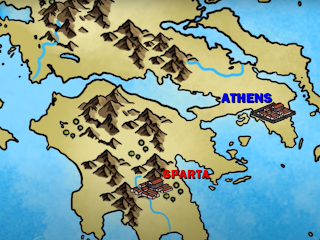In 404 BC after Peloponnesian War, Sparta emerged victorious, claiming Athens' title of hegemon. Sparta's domineering attitude soured its relations with its allies, and in 399 BC the Spartan–Persian alliance collapsed.
King Agesilaus and Lysander (the admiral who had been responsible for Athens' defeat) started Sparta's reign as hegemon with lots of support from the other Greek city-states.
However, Sparta claimed all of the plunder from the Peloponnesian War and it had totally disregarded the wishes and interests of her allies. Sparta had pursued a policy of aggressive expansion in the Peloponnese, central and northern Greece and the Aegean which had at times seemed directed specifically against them.
The name called Corinthian War (395–386) because much of it took place on Corinthian territory, was fought against Sparta by a coalition of Athens (with help from Persia), Boeotia, Corinth, and Argos.
In 394 BC Athenians, Thebans, Corinthians and Argives assemble near Corinth. The Spartans generally demonstrated the superiority of their heavy infantry in pitched battles such as that at Nemea, though in 390BC light peltasts under the Athenian Iphicrates defeated a Spartan hoplite unit in a running battle at Lechaeum. This prevent Spartans from entering central Greece through the isthmus;
Sparta eventually won the war, but only after the Persians had switched support from Athens to Sparta.
With its powerful ally as guarantor, Sparta was able to dictate the terms of the so‐called King's Peace in 386 BC.
Corinthian War (395–387 BC)
King Agesilaus and Lysander (the admiral who had been responsible for Athens' defeat) started Sparta's reign as hegemon with lots of support from the other Greek city-states.
However, Sparta claimed all of the plunder from the Peloponnesian War and it had totally disregarded the wishes and interests of her allies. Sparta had pursued a policy of aggressive expansion in the Peloponnese, central and northern Greece and the Aegean which had at times seemed directed specifically against them.
The name called Corinthian War (395–386) because much of it took place on Corinthian territory, was fought against Sparta by a coalition of Athens (with help from Persia), Boeotia, Corinth, and Argos.
In 394 BC Athenians, Thebans, Corinthians and Argives assemble near Corinth. The Spartans generally demonstrated the superiority of their heavy infantry in pitched battles such as that at Nemea, though in 390BC light peltasts under the Athenian Iphicrates defeated a Spartan hoplite unit in a running battle at Lechaeum. This prevent Spartans from entering central Greece through the isthmus;
Sparta eventually won the war, but only after the Persians had switched support from Athens to Sparta.
With its powerful ally as guarantor, Sparta was able to dictate the terms of the so‐called King's Peace in 386 BC.
Corinthian War (395–387 BC)


